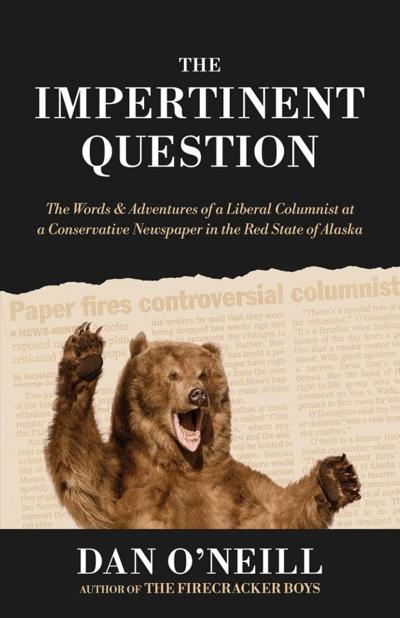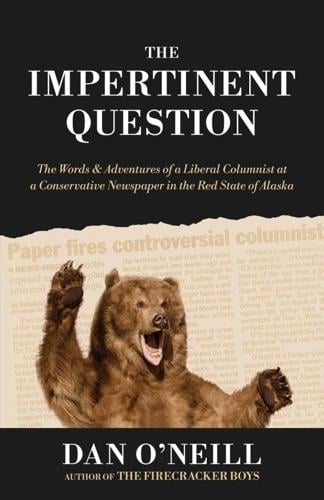Two reactions kept springing to mind as I read Dan O’Neill’s book on “impertinent” questions. First was, “If only I could write like this!” Second was, “How can I most effectively spread awareness of and share this reading experience with other folks?”
Long-term Alaska residents hardly need reminding of Dan O’Neill’s previous award-winning books (“Firecracker Boys,” “A Land Gone Lonesome,” “Last Giant of Beringia”). They already know that the author effectively gave himself “tough acts to follow.” O’Neill’s latest act consists of about 57 short, biweekly, newspaper columns that O’Neill published in the Fairbanks Daily News-Miner, in Alaska’s largest-circulation newspaper, the Anchorage Daily News, or both, mostly during the years 1998-2002. I say “about 57” because O’Neill appears to have sandwiched some of his original columns together so as to avoid repeating key questions — or avoid overworking their pertinence or impertinence — for this entertaining account.
Visitors to this part of the world and readers who have lived more years in the 21st than in the 20th century, take note. Dan O’Neill rolls out the welcome mat for you in the first of his book’s 11 chapters. Alternatively, O’Neill’s first chapter, consisting of six short sub-sections, can be held up like a mirror by old-timey Alaskans (“How Weird Do We Look Today To ‘Outsiders?’”) or skipped for later, so as to get right into the essence of O’Neill’s messages.
It took me a while to admit uncertainty over the word “impertinent” in the title so I finally looked it up in a dictionary. Then in another ... and after half a dozen lookups ... this word yielded an astonishing history. Its meaning has shifted. In 1911, it meant only the opposite of “pertinent,” another way of saying, “irrelevant” to a topic of discussion. In subsequent English and American dictionaries, I’ve traced the rising popular use of the adjective to mean “impudent” or contrarian — almost, but not quite, exclusively. So, readers, a degree of freedom in debating “impertinent.”
Readers should also decide for themselves just where on a spectrum of meaning — from not on the spectrum, through “irrelevant” to “impudent” — any section of O’Neill’s chapters belong. O’Neill’s topics range from people whose writings or whose styles of thinking and acting impress him, to issues as minor-sounding as rights-of-way clearing, to such major-sounding topics as the burial of nuclear waste in Alaska.
Regardless of where you start enjoying O’Neill’s book (either as normal, from its opening pages, or from page 33 onward, as recommended, above, for diehard Alaskans) I presume to offer all readers another suggestion to heighten and widen the enjoyment of O’Neill’s “impertinent” contribution.
This final (I promise) suggestion resurrects my fondness for another author in Dan O’Neill’s league, the late Patrick F. McManus (1933-2018). McManus has entertained generations of outdoorsy folk with books like “The Grasshopper Trap” and “Rubber Legs and White Tail-Hairs.” Nothing rivals the enjoyment that a bunch of us got from reading aloud McManus book chapters, around a campfire or in a tent when stormbound. Almost every chapter in each book reduced one or more readers-aloud to catatonic, hunched-over, breathless mirth, blindly handing off the book to another, less afflicted, member of the circle. I plan to try the read-aloud strategy to see if it answers the second question in the opening paragraph.
Dave Norton, born and schooled in Massachusetts, came to Alaska for graduate studies in 1967 and has lived in Fairbanks and Utqiagvik ever since. He retired from an adjunct research faculty position at the University of Alaska Fairbanks in 2007.













